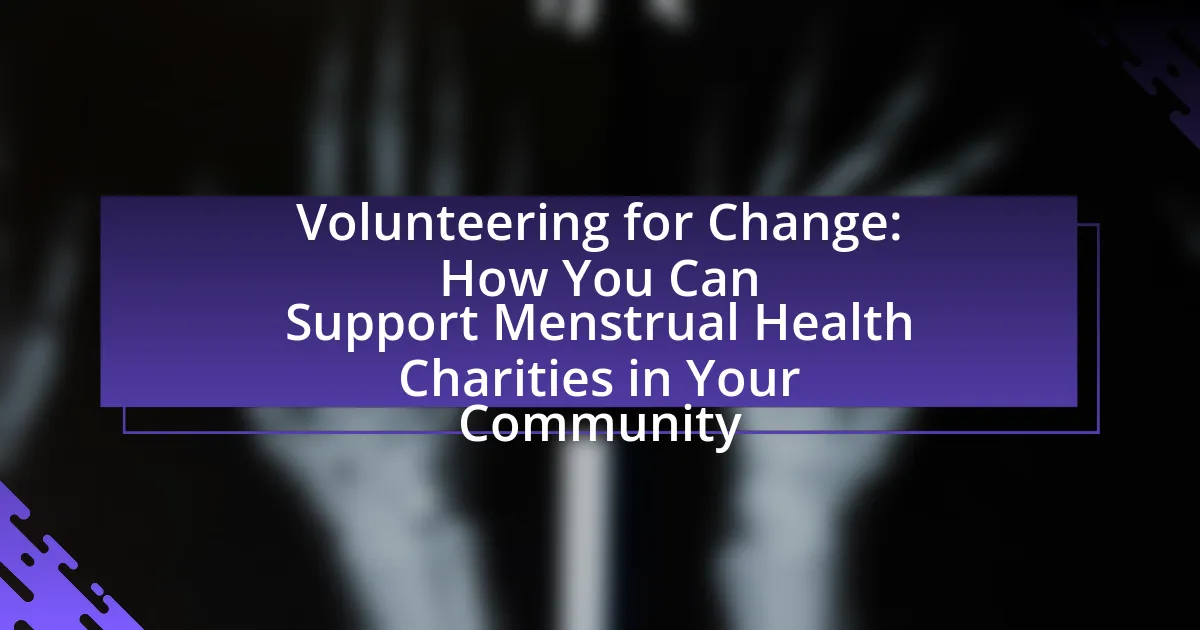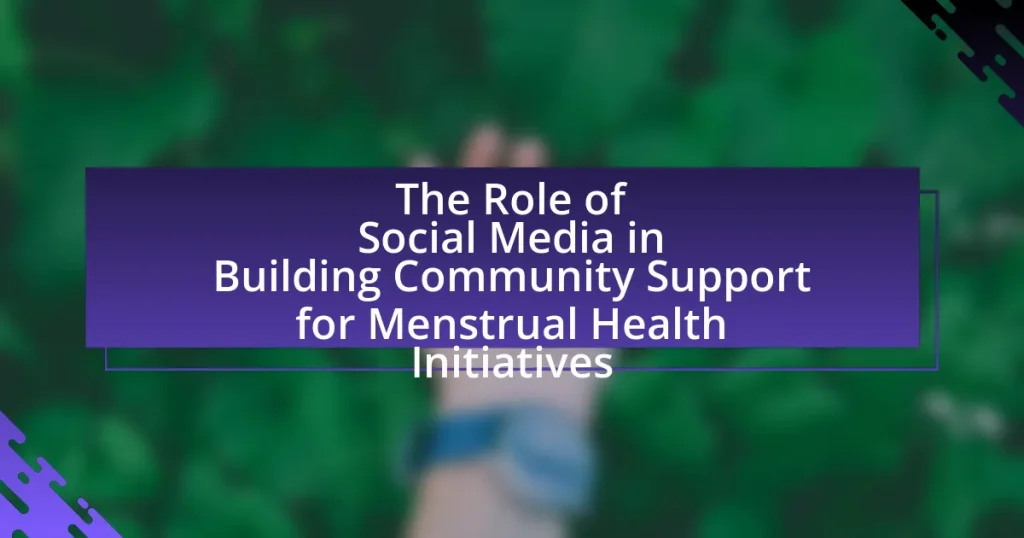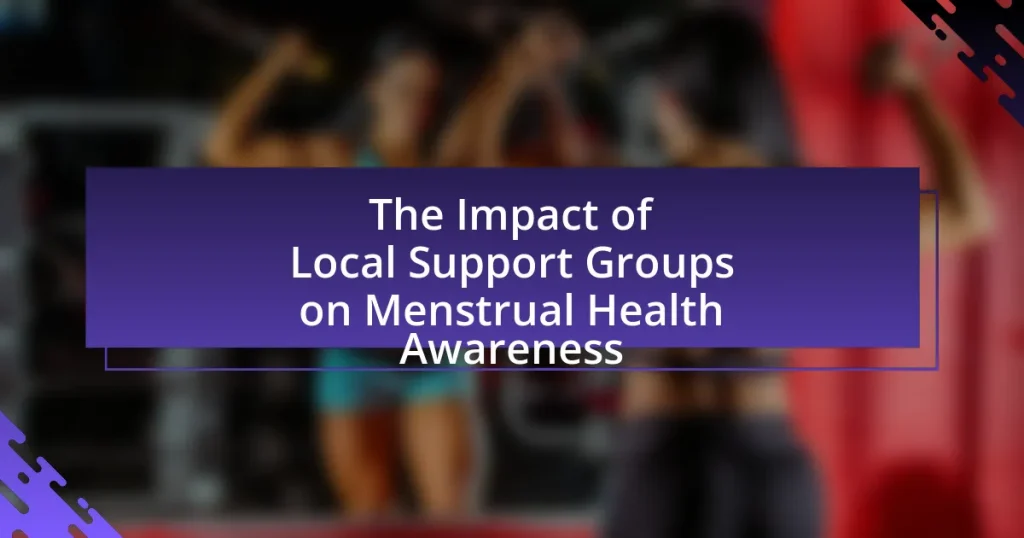Volunteering for Change in Menstrual Health focuses on community engagement to enhance awareness, access to menstrual products, and education regarding menstrual health. The article outlines the significant impact of volunteer efforts on menstrual health charities, highlighting roles such as education, product distribution, and advocacy for policy changes. It discusses the importance of menstrual health in communities, common challenges faced, and the benefits of supporting menstrual health charities. Additionally, it provides insights on how individuals can get involved, the skills needed for effective volunteering, and strategies to raise awareness and reduce stigma surrounding menstruation.

What is Volunteering for Change in Menstrual Health?
Volunteering for Change in Menstrual Health involves actively participating in initiatives aimed at improving menstrual health awareness, access to menstrual products, and education within communities. This form of volunteering can include organizing workshops, distributing menstrual hygiene products, and advocating for policy changes that support menstrual health rights. Evidence shows that such volunteer efforts can significantly reduce stigma and improve health outcomes, as highlighted by organizations like the Menstrual Health Hub, which emphasizes the importance of community engagement in addressing menstrual health challenges.
How does volunteering impact menstrual health charities?
Volunteering significantly enhances the effectiveness and reach of menstrual health charities. By providing manpower, volunteers help these organizations distribute menstrual products, educate communities about menstrual health, and advocate for policy changes. For instance, a study by the Menstrual Health Hub found that volunteer-led initiatives increased product distribution by 40% in underserved areas, demonstrating the direct impact of volunteer efforts on accessibility and awareness.
What roles do volunteers play in supporting menstrual health initiatives?
Volunteers play crucial roles in supporting menstrual health initiatives by providing education, distributing menstrual products, and advocating for policy changes. They educate communities about menstrual health, helping to reduce stigma and misinformation, which is essential for fostering a supportive environment. Additionally, volunteers often organize and participate in campaigns to distribute menstrual hygiene products to those in need, addressing the issue of period poverty. Furthermore, they engage in advocacy efforts to influence policies that promote menstrual health and hygiene, ensuring that these issues receive the attention they deserve in public health discussions. These contributions are vital for improving access to menstrual health resources and promoting awareness in communities.
How can volunteering improve community awareness about menstrual health?
Volunteering can significantly improve community awareness about menstrual health by facilitating educational programs and outreach initiatives. Volunteers often engage directly with community members, providing accurate information and resources about menstrual health, which helps to dispel myths and reduce stigma. For instance, organizations like Days for Girls have reported that volunteer-led workshops increase knowledge about menstrual hygiene management, leading to better health outcomes and increased confidence among participants. This hands-on approach not only informs individuals but also fosters a supportive environment where open discussions about menstrual health can occur, ultimately enhancing community understanding and acceptance.
Why is menstrual health important in communities?
Menstrual health is important in communities because it directly impacts the physical, mental, and social well-being of individuals who menstruate. Access to proper menstrual health resources can reduce stigma, improve educational outcomes, and enhance overall health. For instance, studies show that lack of menstrual hygiene management can lead to school absenteeism, with girls missing up to 20% of school days due to menstruation. Furthermore, promoting menstrual health fosters gender equality by empowering individuals to participate fully in society without the barriers imposed by inadequate menstrual care.
What are the common challenges faced regarding menstrual health?
Common challenges faced regarding menstrual health include stigma, lack of access to menstrual products, inadequate education, and insufficient healthcare services. Stigma surrounding menstruation often leads to shame and silence, preventing open discussions and support. Many individuals, particularly in low-income areas, struggle to access affordable menstrual products, which can lead to missed school or work. Additionally, a lack of comprehensive education about menstrual health contributes to misinformation and poor management of menstrual hygiene. Finally, inadequate healthcare services often fail to address menstrual health issues, leaving individuals without necessary medical support or resources.
How does menstrual health affect overall community well-being?
Menstrual health significantly impacts overall community well-being by influencing educational attainment, economic productivity, and social equity. When individuals have access to proper menstrual hygiene products and education, they are more likely to attend school consistently, leading to higher educational outcomes. For instance, a study by the World Bank found that girls who manage menstruation effectively are 25% more likely to complete their education. This educational attainment translates into better job opportunities and economic contributions, enhancing community productivity. Furthermore, addressing menstrual health promotes gender equality, as it empowers women and girls to participate fully in society. Communities that prioritize menstrual health see improved health outcomes and reduced stigma, fostering a more inclusive environment.

How Can You Get Involved with Menstrual Health Charities?
You can get involved with menstrual health charities by volunteering your time, donating funds, or organizing awareness campaigns. Many organizations seek volunteers for various roles, including event planning, outreach, and education. For instance, charities like Period.org and Days for Girls actively recruit volunteers to help distribute menstrual products and educate communities about menstrual health. Additionally, financial contributions can significantly impact these charities’ ability to provide resources and support. According to a report by the Global Menstrual Health Coalition, increased funding for menstrual health initiatives can improve access to menstrual products for millions of individuals worldwide.
What types of volunteering opportunities are available?
Various types of volunteering opportunities are available within menstrual health charities, including educational outreach, fundraising events, and direct service roles. Educational outreach involves volunteers conducting workshops or seminars to raise awareness about menstrual health issues. Fundraising events require volunteers to organize and participate in activities aimed at generating financial support for the charity’s initiatives. Direct service roles may include distributing menstrual products to those in need or assisting in community health programs. These opportunities not only support the charity’s mission but also engage volunteers in meaningful community service.
How can you find local menstrual health charities to support?
To find local menstrual health charities to support, start by searching online directories such as Charity Navigator or GuideStar, which list organizations by location and focus area. Additionally, local community centers, health clinics, and universities often have information on charities that address menstrual health issues. According to a report by the Menstrual Health Alliance, many grassroots organizations focus on menstrual equity and can be found through social media platforms like Facebook and Instagram, where they promote their initiatives and events.
What skills are beneficial for volunteering in this area?
Skills beneficial for volunteering in menstrual health charities include communication, empathy, organizational skills, and knowledge of menstrual health issues. Effective communication is essential for educating the community and advocating for menstrual health awareness. Empathy allows volunteers to connect with individuals facing challenges related to menstrual health, fostering a supportive environment. Organizational skills are crucial for managing events, distributing supplies, and coordinating outreach efforts. Knowledge of menstrual health issues, including access to products and education, enhances the volunteer’s ability to provide accurate information and support. These skills collectively contribute to the effectiveness of volunteers in promoting menstrual health initiatives.
How can you raise awareness for menstrual health issues?
To raise awareness for menstrual health issues, individuals can engage in community education initiatives that provide accurate information about menstrual health. These initiatives can include workshops, seminars, and informational campaigns that address common misconceptions and promote understanding of menstrual hygiene management. Research indicates that education significantly improves knowledge and attitudes towards menstrual health, as seen in studies conducted by the World Health Organization, which highlight the importance of informed communities in reducing stigma and improving health outcomes.
What strategies can be used to engage your community?
To engage your community effectively, implement strategies such as organizing awareness campaigns, hosting educational workshops, and facilitating volunteer opportunities. Awareness campaigns can raise visibility about menstrual health issues, as evidenced by studies showing that informed communities are more likely to support related initiatives. Educational workshops can provide essential information and resources, fostering a deeper understanding of menstrual health challenges. Additionally, creating volunteer opportunities allows community members to actively participate in supporting menstrual health charities, which has been shown to increase community cohesion and commitment to social causes.
How can social media be leveraged for awareness campaigns?
Social media can be leveraged for awareness campaigns by utilizing targeted messaging, engaging visuals, and interactive content to reach a broader audience. Platforms like Facebook, Instagram, and Twitter allow organizations to share impactful stories, statistics, and calls to action that resonate with users. For instance, a campaign focused on menstrual health can use infographics to highlight statistics about period poverty, thereby educating the audience while encouraging shares and discussions. Research indicates that social media posts with images receive 94% more views than those without, demonstrating the effectiveness of visual content in capturing attention and driving engagement.

What Are the Benefits of Supporting Menstrual Health Charities?
Supporting menstrual health charities provides essential benefits such as improving access to menstrual products, education, and healthcare for individuals in need. These charities address the stigma surrounding menstruation, promote awareness, and advocate for policy changes that enhance menstrual health rights. For instance, studies show that lack of access to menstrual products can lead to absenteeism in school and work, impacting economic opportunities. By supporting these charities, individuals contribute to breaking the cycle of poverty and improving overall health outcomes for marginalized communities.
How does volunteering contribute to personal growth?
Volunteering contributes to personal growth by enhancing skills, fostering empathy, and building social connections. Engaging in volunteer work allows individuals to develop practical skills such as leadership, communication, and problem-solving, which are transferable to personal and professional contexts. Additionally, volunteering exposes individuals to diverse perspectives and challenges, promoting empathy and understanding of different social issues. Research from the Corporation for National and Community Service indicates that volunteers report higher levels of life satisfaction and improved mental health, reinforcing the positive impact of volunteering on personal development.
What skills can you develop through volunteering?
Volunteering can help individuals develop a variety of skills, including communication, teamwork, leadership, problem-solving, and time management. Engaging in volunteer activities often requires effective communication with diverse groups, enhancing interpersonal skills. Teamwork is fostered through collaboration with other volunteers and organizations, while leadership skills can be cultivated by taking initiative or leading projects. Problem-solving abilities are sharpened as volunteers encounter and address challenges in real-time. Additionally, managing time effectively is crucial to balance volunteering with other commitments. Research indicates that 70% of volunteers report improved skills in these areas, demonstrating the tangible benefits of volunteering experiences.
How does volunteering enhance your understanding of social issues?
Volunteering enhances understanding of social issues by providing direct exposure to the challenges faced by communities. Engaging with diverse populations allows volunteers to witness firsthand the complexities of social problems, such as poverty, inequality, and health disparities. For instance, volunteering with menstrual health charities reveals the stigma and lack of resources surrounding menstrual hygiene, which affects many individuals’ well-being and education. This experiential learning fosters empathy and a deeper comprehension of systemic issues, as volunteers interact with those impacted and learn about the broader societal context.
What impact does volunteering have on the community?
Volunteering positively impacts the community by fostering social cohesion and addressing local needs. When individuals engage in volunteer work, they contribute to the well-being of their neighborhoods, often filling gaps in services such as health care, education, and social support. For instance, a study by the Corporation for National and Community Service found that volunteers contribute an estimated $184 billion annually to the U.S. economy, highlighting the significant economic and social benefits of volunteerism. Additionally, volunteering enhances community resilience by building networks of support and encouraging civic engagement, which can lead to improved public health outcomes and increased awareness of issues like menstrual health.
How can volunteers help reduce stigma around menstruation?
Volunteers can help reduce stigma around menstruation by engaging in educational outreach and community awareness programs. These initiatives can include organizing workshops that provide accurate information about menstruation, dispelling myths, and promoting open discussions. Research indicates that education significantly decreases stigma; for instance, a study published in the Journal of Adolescent Health found that comprehensive menstrual education led to improved attitudes and reduced shame among participants. By facilitating conversations and sharing knowledge, volunteers play a crucial role in normalizing menstruation and fostering a supportive environment.
What long-term benefits can arise from community engagement in menstrual health?
Community engagement in menstrual health can lead to improved health outcomes, increased awareness, and reduced stigma surrounding menstruation. By actively involving community members, organizations can foster a supportive environment that encourages open discussions about menstrual health, leading to better education and access to resources. Research indicates that communities with strong engagement in health initiatives experience a 20% increase in health literacy, which directly correlates with improved health practices and outcomes. Furthermore, sustained community involvement can result in policy changes that enhance menstrual health services, ensuring long-term benefits for future generations.
What are some best practices for effective volunteering?
Effective volunteering involves clear communication, commitment to the cause, and understanding the needs of the organization. Volunteers should actively engage with the charity’s mission, ensuring their skills align with the tasks required. Research indicates that volunteers who receive proper training and orientation are more effective, as they feel prepared and confident in their roles. Additionally, maintaining a flexible attitude allows volunteers to adapt to changing circumstances, which is crucial in dynamic environments like charity work. Regular feedback and reflection on the volunteering experience enhance personal growth and improve future contributions.
How can you ensure your efforts are impactful?
To ensure your efforts are impactful, focus on aligning your skills and resources with the specific needs of menstrual health charities in your community. Conduct thorough research to identify the most pressing issues these organizations face, such as access to menstrual products or education on menstrual health. For instance, a study by the Menstrual Health Alliance found that 1 in 5 girls in low-income areas miss school due to lack of menstrual supplies, highlighting the critical need for support. By targeting your volunteer work or donations to address these gaps, you can maximize the effectiveness of your contributions and create meaningful change.
What common challenges should you be prepared for while volunteering?
Common challenges while volunteering include time commitment, emotional strain, and resource limitations. Volunteers often struggle to balance their personal schedules with the demands of the organization, which can lead to burnout. Emotional strain arises from witnessing the hardships faced by those in need, particularly in sensitive areas like menstrual health, where stigma and lack of resources can be prevalent. Additionally, many organizations face resource limitations, making it difficult to provide adequate support and services, which can be frustrating for volunteers who want to make a meaningful impact. These challenges are well-documented in volunteer management literature, highlighting the importance of preparation and support systems for effective volunteering.



